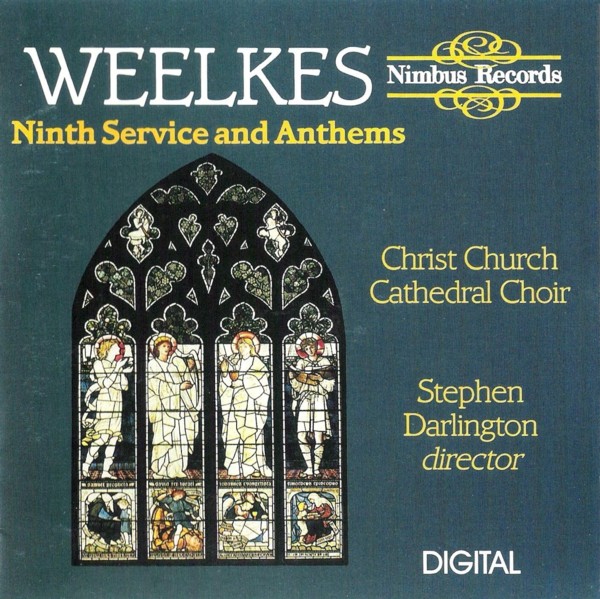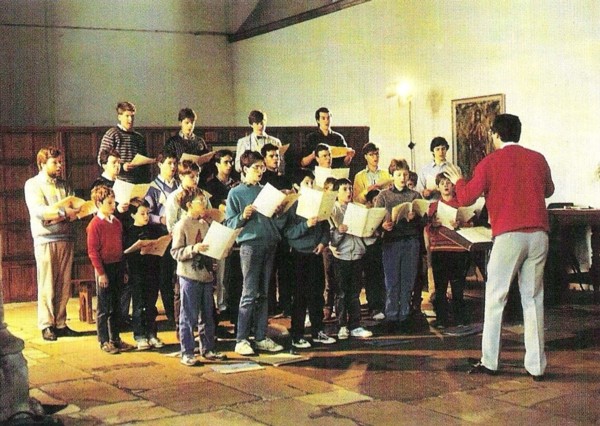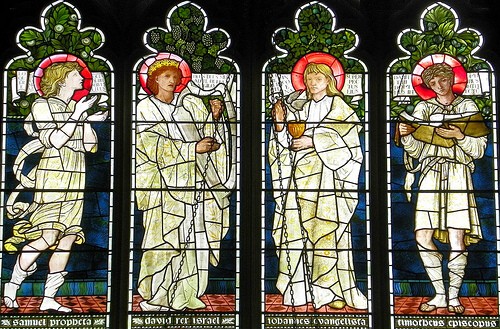
Nimbus NI 5125
1988

Nimbus NI 5125
1988
01 - Alleluia, I heard a voice [2:56]
02 - Give ear, O Lord [5:31]
Evening Service for five voices
03 - Magnificat [6:20]
04 - Nunc Dimittis [3:10]
05 - Hosanna to the Son of David [1:51]
06 - When David Heard [4:56]
07 - O Lord, Grant the King a Long Life [2:01]
08 - Give the King Thy Judgements [5:31]
09 - Gloria in Excelsis Deo [3:01]
Ninth Service
10 - Magnificat [8:37]
11 - Nunc Dimittis [6:48]
Christ Church Cathedral Choir
Stephen Darlington
Choristers
James Ridgway
George Godsal
Martin Illingworth
Benjamin Hughes
William Smith
Kieron Maiklem
Michael Forbes
Thomas Morris
James Weeks
Gulliver Ralston
James Gorick
Michael Speight
Peter Weir
Angus McCarey
Ranjeet Guptara
Lay and Academical Clerks
Altos:
Stephen Carter I II
Richard Roberts I
Andrew Olleson
Stephen Taylor
Nicholas Barker
Tenors:
Edwin Simpson
Matthew Vine
Ciaran O'Keefe
Andrew Carwood
Basses:
David Le Monnier
Paul Martin
Tim Bennett
Edward Wickham
Organist: Laurence Cummings
I Soloist in "Give ear O' Lord"
II Soloist in "Give the King Thy Judgements"
Recorded at Dorchester Abbey, OxfOrdshire,
13th and 14th March, 1988
by Nimbus

THOMAS WEELKES
The period during which Thomas Weelkes (c. 1576—1623) composed
most if not all of his church music — roughly the first two
decades of the seventeenth century — was also a period of decline
and fall in his professional career and private life. Biographical
details elude us, and it may never be known why the young successful
madrigal composer of the 1590s ended his days in disgrace among the
cathedral authorities of Chichester, dismissed from his post as
organist on grounds of his being a habitual common drunkard and a
notorious swearer and blasphemer. Weelkes evidently aspired to higher
things: several of his anthems and services were written not with
Chichester in mind but for the more sumptuous services and ceremonies
of the Chapel Royal, and it is clear that Weelkes did have some
informal contact with that institution. But he never consolidated the
London connection to the extent that he could leave provincial
Chichester. Perhaps the debauched habits of which he was later accused
were more the cause of stagnation in his career than the effect of it.
Set beside William Byrd and Orlando Gibbons, the two outstanding
figures in church music during the reign of James I, Weelkes must have
appeared a curiosity. His music was weakest in the respects those two
composers rated most highly: Weelkes had never been particularly
interested in sensitive word-setting, and he probably lacked the
ability — or perhaps the patience — to compose counterpoint
of any great sophistication or skill. His talents lay rather in the
making of thrilling textures, ravishing sonorities, exhilarating
rhythms and, when the moment seemed right, marvellously spicy
harmonies. Those are the hallmarks of the extraordinary sequence of
madrigals Weelkes wrote when still barely out of his teens. What the
aged Byrd and serious-minded Gibbons can have thought of the anthems
and service music Weelkes subsequently composed, often in a style
instantly recognizable from the madrigals, it is not difficult to
imagine. Success for Weelkes came posthumously: later generations of
church musicians have warmed to this impulsive, colourful music, and
today his works have a secure place in the cathedral repertory.
The selection of music recorded here falls roughly into two sequences,
one representing works of a general nature composed for no specific or
known destination, the other, pieces that Weelkes probably or possibly
wrote with courtly circles in mind. Although they span some twenty
years of work, only one piece can be dated with any accuracy. But
chronology is in a sense unimportant; the fact that stylistically these
anthems and services project such a strong sense of a single, unique
personality testifies to Weelkes's confidence in and satisfaction with
his musical language, and they show little evidence of a mind searching
for new modes of expression and alternative musical structures. Modem
as Weelkes's madrigalisms may be by the standards of English church
music of the day, at heart his music is embedded in tradition and
nourished by a strong sense of heritage.
Like so many Jacobean anthems, Weelkes's Alleluia, I heard a voice
was prized equally highly by domestic musicians and church choirs. It
may even originally have been intended for solo voices and a consort of
viols rather than for liturgical use. One manuscript source specifies
it "For All Saints' Day", but any joyful occasion would be well served
by this confident, forthright and strongly rhythmical work, with its
pealing chains of Alleluias. Give ear, O Lord another
all-purpose anthem, differs both in the nature of its text — a
penitential, and at the time well-known poem by William Hunnis —
and in the scoring for verses (soloists accompanied by organ)
alternating with passages for full choir. Text and texture here fuse
together: each stanza closes with the refrain "Mercy good Lord" set for
full choir to related but always slightly varied music.
In common with so many of Weelkes's other settings of the morning and
evening canticles, the Evening Service for Five Voices survives in a
fragmentary state. In fact, performance of this particular work has
been made possible today only after major surgery. The vocal lines
themselves are completely lost; all that remains of the setting is an
organ part that conflates the choir's music into what two hands can
play at the keyboard. Various editors have attempted to unravel the
tangle; the version performed here is by David Wulstan. Reasonably
substantial by the standards of the day, the service is set for full
choir without solo verses, but it includes some enterprising
subdivisions, in particular the passage for high four-part choir in the
Nunc dimittis — inspired no doubt by the words "to be a light to
lighten the gentiles".
The four anthems that follow all seem in one way or another to be
'royal' works. Hosanna to the Son of David like Gibbon's
setting of the same text, may have been composed as a welcome song for
James I or one of his sons; certainly the exuberant style suggests
ceremonial rather than everyday use. When David heard together
with a host of textually-related pieces by Weelkes's contemporaries,
was almost certainly prompted by the premature death of Henry Prince of
Wales, in 1612. It sounds like a solemn madrigal, and indeed it might
have been written with domestic performance in mind. The magnificent
seven-voice anthem O Lord, grant the King a long life takes as
its text two verses from Psalm 61 which, in Weelkes's setting assume
the quality of a paean of praise for James I and a prayer for his
preservation. This is another full anthem; by contrast, Give the
King thy judgements which draws similarly patriotic words from
Psalm 72, is scored for verses, although on a scale larger than usual
for the day.
Gloria in excelsis Deo stands somewhat on its own. Technically
the work is a carol — which is to say, by Tudor definition, that
it consisted of a central verse (others may be lost) flanked on either
side by a refrain, and has a strong seasonal element, in this case
Christmas. Church choirs soon absorbed the piece into their
repertoires, but it is likely that this work too was first sung by solo
voices in the hall or chamber of a Jacobean house.
The final work is by far the largest on record, and the most extended
composition known by Weelkes. It belongs to the category of the 'great'
service, conceived on the grandest scale and written for a special
occasion or destination. Again the Chapel Royal comes to mind, and the
fact that at several places in the service Weelkes quotes blocks of
music from the anthem O Lord, grant the King a long life
strengthens that possibility. Nominally scored for a seven-part choir,
Weelkes in practice freely subdivides and regroups his forces from
verse to verse in a conscious effort to recall the sonorities and
textual variety of English music a hundred years earlier. Some of the
scorings remain conjectural, however: like the Evening Service for Five
Voices, the Ninth Service survives in a defective state, and David
Wulstan has provided music for the voice-parts that are missing from
the manuscripts.
© John Milsom 1988
